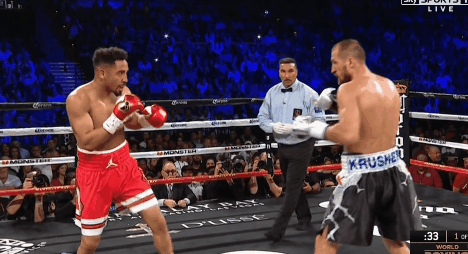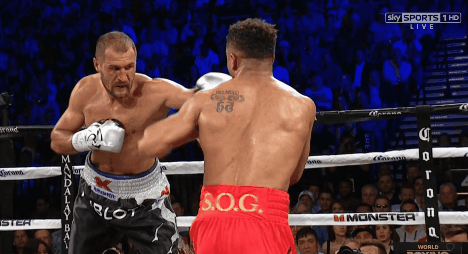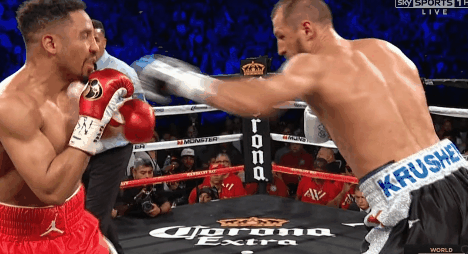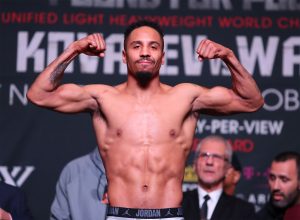Andre Ward, a fighter, finishes Sergey Kovalev, the bogeyman
Bart Barry June 19, 2017
Leave a comment




By Bart Barry-
Saturday at Mandalay Bay, in a rematch barely anticipated for being unpromoted, American Andre Ward defended his super middleweight championship by stopping Russian Sergey Kovalev at 2:29 of round 8. Aficionados will litigate the finale for a long while because, bereft of reliably violent spectacles these last five years, aficionados have evolved into a litigious, petty bunch.
Here’s how the match ended: One man, contracted to fight, bent himself at the waist, perched himself on the ropes, and silently beseeched the referee to intervene. The other man contracted to fight threw haymakers at his opponent’s midsection until the referee made him stop. Because this was a fight, the man who kept fighting won, and the man who stopped fighting lost. If you’re looking for more nuance than that, stop reading this and go watch HBO replays with the volume turned up.
There is something uniquely nauseating about a man who uses the word “unfair” to describe his plight. It implies both a lack of volition and a childish belief some parental figure or other is supposed to ensure outcomes correspond to his wishes – whether those wishes are for fairplay or preferential rulings or a compliant media. It is an expression of weakness that says: “Whoever was supposed to protect me from the unfavorable didn’t, and I had to fend for myself, and I couldn’t, and it’s not my fault.” It’s a speech difficult to abide from a toddler and impossible to respect from a man.
Immediately after being folded in two by an opponent whose career he promised to end violently, Kovalev didn’t use the word “unfair” – and the charitable interpretation of this is that he has enough character, enough masculinity, not to do so. The uncharitable explanation is that he lacks the vocabulary. For, at various moments in the fight, Kovalev did wear the mien of a man whose mind cycled through the Russian word for “unfair” way more than a prizefighter’s should.
In the first match of what will not be a trilogy Kovalev dropped Ward, and Ward wore the customary look of surprise – lead actor in a theater of the absurd – every great fighter wears whenever he gets dropped. Ward was not prepared for what happened but soon regained, through some combination of character and great conditioning, sufficient semblance of himself to neutralize Kovalev’s attack just enough to get to his corner and 60 seconds of refuge. By comparison to Ward, Kovalev looked singularly unprepared for the experience of pain and fatigue he felt in Saturday’s eighth round.
Did Ward’s punches land below the upper line of Kovalev’s silvertrimmed trunks? Yes. Did they land below Kovalev’s bellybutton? Maybe. Did they land on Kovalev’s testicles? No.
The universal remedy taught in every gym in the world for a man who hits you low is to repay him with the same coin. This is prizefighting, after all, not boxing, and when you are paid 40 or so times a workingman’s salary to entertain workingmen with your savagery you forfeit some of the appellate processes afforded lawyers and bankers, see; you are expected to remedy most injustices with your own hands. Heaven knows Tony Weeks would’ve allowed it. Weeks is a fight-friendly ref – part of the reason Marcos Maidana roughedup Floyd Mayweather three years ago, part of the reason Ward broke Kovalev in half Saturday, and all of the reason Kenny Bayless was in the ring for Mayweather-Maidana 2.
One of the qualities that make Ward a great prizefighter where Kovalev is a good one is the men’s differing reactions to what adversity happens when their opponents break rules. Kovalev struck Ward behind the head a number of times in the match, and each time sharpened Ward’s concentration on the objective of giving Kovalev commensurate pain. Ward struck Kovalev lower than Kovalev expected to be struck a number of times in the match, and each time sharpened Kovalev’s concentration on the inadequacy of the referee’s reaction. “Krusher” Kovalev, the man who would beat Ward till he could no longer support his family with prizefighting, lowered his hands and lowered his head and winced and turned his back – overcome with pain and an acute sense of unfairness.
Again, if your fortune is made pandering to Americans’ lasting fears of psychopathic Soviets, you don’t get to sit on the lower ropes, arms crisscrossing your belly and a look of betrayal on your face, while a guy from Oakland wales the daylights out of you – it’s catastrophic to your brand.
Writing of brands, since that’s the thing these days, Krusher will probably be back on HBO before Ward is because HBO no longer has the money or energy to do better;
Kovalev can fire his American trainer, import some legendary coach from Chelyabinsk, go back to hipthrusting at overmatched opponents for reliable purses, conduct ferocious postfight-interview callouts at men who’ve no reason to fight him, and dance nimbly round the fact his career’s defining win came against someone two months from his 50th birthday.
For Ward the future is trickier. A unification match with Adonis Stevenson is the best idea, but Stevenson’s understandable fidelity to Showtime (who else’d’ve paid him to fight such challengers?) is an obstacle only pay-per-view revenue might surmount. Trouble is, Ward’s not a pay-per-view draw, and everyone in the fight game knows it except Ward and his promoter. Ward’s not a ticketseller or a salesman, a very good commentator or interview. Honestly, he’s not much of an an entertainer of any sort.
But he is one hell of a fighter.
That’s worth more than the sum of every other thing.
Bart Barry can be reached via Twitter @bartbarry





























